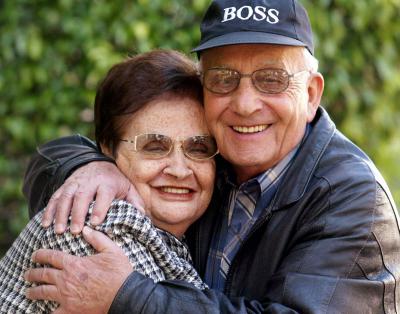Friday, 19 December 2003 (Sabbath eve and the first night of Hanukah) was an ordinary day of work for Oxana Korol. She barely noticed three visitors who apparently had no intention of searching the Database of Shoah Victims’ Names. Nevertheless, she offered her routine advice to one of them — an elderly lady — to use this opportunity to search the database for possible entries of family members.
Shoshana November had visited Yad Vashem several times before, but had never searched for the names of dear ones who had perished in the Holocaust. Then a friend from the United States who was making a documentary film about Shoshana asked her to accompany her on a visit to Yad Vashem.
Korol helped Mrs. November search the database and they soon found a Page of Testimony in memory of her father, Yakow Shlamowicz, which she had submitted in 1956. The Page also listed two of her brothers — Beniek and Samek — as having died. Shoshana remembered a third brother, Shlamek, whom she assumed was also dead. They searched the database further and, to their surprise, found an additional Page of Testimony on Yakow Shlamowicz, submitted in 1999 by Binyamin (Benny) Shilon, formerly Beniek Shlamowicz, in memory of his own father.
It quickly became apparent that four years previously, Benny had sent to Yad Vashem Pages of Testimony recording all his family as Holocaust victims. Among them were his parents Yakow and Basia, brothers Shlamek and Samek, and younger sister Ruza Shulamit Shlamowicz (now Shoshana November).
It was one of those cases when two survivors thought the other had perished in the Holocaust. Even more astonishing was that the brother and sister had lived for almost half a century only 70 km from each other in Israel, a small country with rarely more than a degree or two of separation. After long decades of despair they had finally found each other, thanks to Yad Vashem and the unique collection of Pages of Testimony. These Pages — symbolic tombstones of those who perished — are actually sometimes the key to linking long-lost living relatives.
Both siblings were born in Warsaw: Beniek (Benny) in 1926, and Ruza (Shoshana) in 1930. Due to unfortunate family circumstances, Beniek and Ruza, along with their brothers, were dispersed in orphanages or to their relatives’ families. Ruza spent some years in Dr. Janusz Korczak’s orphanage. But on the eve of the war, Ruza was reunited with her father, who had settled in Krakow.
Against all odds, Ruza had survived the Holocaust in Nazi concentration and extermination camps, including Auschwitz, where an elderly woman pushed her out of the line of children waiting to enter a gas chamber. Meanwhile, Beniek had found shelter in the Soviet Union; from 1943 he fought the Germans in the ranks of the Red Army. In early 1945, he was among those who liberated Auschwitz. However, by that time Ruza was being forcibly transferred by the Nazis to Ravensbrueck. She was finally liberated in Neustadt-Glewe, a sub-camp of Ravensbrueck, on 2 May 1945.
Ruza came to Israel in 1948 and settled in Bnei Brak; Beniek arrived from Poland in 1957. Although Ruza had filled out Pages of Testimony in 1956, it had taken her brother more than 40 years to do the same: after so many years of silence, he simply assumed no one was still alive. “I looked for her and my siblings during all the years after the war,” Benny recalled, after their reunion. “You cannot describe this in words. I grew up alone and I was immune to crying; I didn’t know how. But last night, I cried.”







